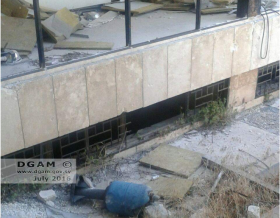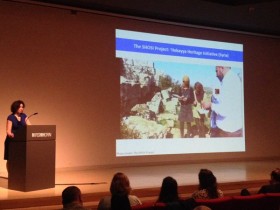4 Ways You Can Help Cultural Heritage
Cultural heritage is the closest thing we have to time travel. You can use cultural heritage to connect with past generations and with someone who you’ll never be able to meet. If this damage continues unchecked, we will lose more than just […]
World Heritage Day Symposium Twitter Recap
World Heritage Day—Protecting, Preserving, and Presenting the Cultural Heritage of the Near East to the Public ASOR and AIA (The Archaeological Institute of America), in cooperation with the Smithsonian Institution […]
Archaeology and Cultural Heritage in Egypt after Mubarak
By: Greg Williams Egypt’s January 25th revolution was originally seen as part of the larger “Arab Spring” across the Middle East where old political regimes were overthrown by popular protests and replaced by representative democracies. But on January 28th, as chaos reigned in Cairo’s Tahrir Square, reports began circulating around the globe claiming that […]
ASOR and Archaeological Ethics
By: Lynn Swartz Dodd “There is a tendency at every important but difficult crossroad to pretend that it’s not really there.” —Bill McKibben What should American Schools of Oriental Research (ASOR) members do if new Dead Sea Scrolls are found? What if our country’s military actions increase uncontrolled looting of ancient sites? Or if war […]
Using Inscriptions from the Antiquities Market: Polarized Positions and Pragmatic Proposals
By: Christopher A. Rollston Archaeological sites in the Middle East have been ransacked, pillaged, and plundered for many decades. The motivations of the actual pillaging are normally economic: the pursuit of marketable artifacts. That is, the pillagers wish to find objects that can be sold to collectors. Of course, the motivations of the collectors who […]
The Dilemma of Denial: Scholarly Publication Policies and the Illusion of Power
By: Jonathan Rosenbaum President Emeritus, Gratz College For generations, academic journals have been deemed the appropriate venue for the initial publication of ancient inscriptions and artifacts. Nevertheless, last fall, the New York Times became the source of an editio princeps when it announced the discovery of a “faded papyrus fragment” that seemed to be “first […]
The Terms of Heritage
By: Kathryn McDonnell Specialized terminology, such as stake holders, the “universal museum,” provenance, or even the phrases, “cultural property” or “cultural heritage,” is often used during discussions between law enforcement professionals, such as Homeland Security Investigations (HSI) in the US or the Carabinieri in Italy, diplomats (ICOMOS), lawyers, and scholars, including archaeologists. Although these terms […]
WikiLoot, crowdsourcing against the illicit antiquities trade
Jason Felch, a Los Angeles Times investigative reporter and co-author of Chasing Aphrodite: The Hunt for Looted Antiquities at the World’s Richest Museum—a look into the Getty’s involvement in the illegal antiquities trade—agreed to answer a few questions for us about his latest project, WikiLoot. Can you sum up what WikiLoot is? WikiLoot is a web […]
Protecting Archaeological Sites in Conflict Zones: What Is to be Done in Syria?
By: Lawrence Rothfield The recent upsurge in high profile news stories, in Time and other mass media outlets, about the looting of archaeological sites in Syria has been accompanied by the usual public handwringing by archaeologists and heritage protection organizations. The terrible impact on the world’s cultural patrimony is bewailed, and the heads of UNESCO, […]
Christina Luke on Building Understanding and Countering the Illegal Trade in Antiquities
One of the highlights of the ASOR Workshop, SECONDARY CONTEXT I, was a contribution by Christina Luke, the noted researcher and scholar of legislation pertaining to the regulation of the movement of unprovenienced artifacts.
Changing attitudes toward looting. What are your ideas?
By Dr. Lynn Swartz Dodd A growing body of literature documents the reality that the ancient, buried landscape of Israel, including the areas known as the West Bank and Gaza, are being inexorably and irretrievably looted. Looting refers to a process by which objects are removed without official permission or archaeological oversight and documentation. [1] […]
A Class Trip to the Metropolitan Museum of Art
Rachel Hallote Purchase College SUNY Next week I will be taking the students in my “Politics and Archaeology” course to the Metropolitan Museum of Art. We’ll be going as part of our unit on unprovenanced artifacts, collecting, looting and forgeries. The assignment I give the class is simple: With a partner, choose a section of […]
ON SHOPPING FOR ARTIFACTS IN THE HOLY LAND: A RESPONSE TO MORAG M. KERSEL
G.M. Grena The LMLK Research Website, founder/editor Foreword In comments to Dr. Kersel’s article (Buyer Beware: Shopping for Artifacts in the Holy Land), I expressed disappointment over the undocumented, arbitrary nature of her claims, which amount to an opinion based on hearsay, and contribute little if anything towards scientific knowledge. Herewith, I will present […]
FORGING HISTORY: MOTIVES, METHODS, AND EXEMPLARS OF FORGED TEXTS [1]
EnglishEnglishFrenchPowered by TranslateChristopher A. Rollston, Toyozo Nakarai Professor of Old Testament and Semitic Studies, Emmanuel Christian Seminary I. MOTIVATIONS FOR THE PRODUCTION OF FORGERIES Forgeries have been produced for many centuries (Metzger 1997, 125-139; Rollston Ehrman) and it would not be prudent to believe that the future shall be different […]
The Secondary Context Workshop: A Report
A Report In the waning days of November, colleagues in archaeology and related sciences with special interest in research issues centering on the Ancient Near East gathered in San Francisco for their annual meeting. Over 800 of some 1300 members were in attendance; and of these, fully ten percent attended our workshop!
Buyer Beware: Shopping for Artifacts in the Holy Land
Morag M. Kersel DePaul University Although the recent outcome of the “Trial of the Century” did nothing to settle debate over the authenticity of the inscription on the James Ossuary, this case confirms that artifacts that are purchased on the market are entangled in webs of intrigue. We will never know the exact archaeological […]
April Theme: Fakes, Looting, and Artifacts Lacking Context
The ASOR Blog is pleased to announce a new “theme” for the month of April—Unprovenanced Artifacts and Possible Forgeries. The ASOR Blog will continue to post other items of interest that are submitted by the ASOR Staff and ASOR Members, but (just like we did in March) we will solicit posts on the “theme” […]
The Response of the Israel Antiquities Authority to the Verdict by the Jerusalem District Court in the Matter of the Forgeries Trial
This morning (Wednesday, March 14) the verdict was published in the prosecution’s case—the State of Israel vs. Oded Golan, Robert Deutsch, et alia—Criminal Case 482/04. [This post is taken from the IAA website and re-posted on the ASOR Blog] In response to the decision by Judge Aharon Farkash of the Jerusalem District Court, the Israel […]
Eric Meyers’ reaction to the verdict in the forgery trial in Israel
Reaction to Golan Acquittal, Professor Eric M. Meyers, Duke University The verdict announced today, March 14, by Judge Aharon Farkash in Jerusalem, acquitting Oded Golan and Robert Deustch of all major charges comes as no surprise. The James ossuary first came into public view some ten years ago in Toronto when a special exhibition was […]
Archaeology in the News
Here are some links to recent news from the world of Archaeology! It looks like the artifacts in the Cairo museum are now being protected, but not all of them. Â Here is an interesting YouTube video of the looting at the Cairo museum. Â Other sites around Egypt need protecting as well. The preservation of […]


